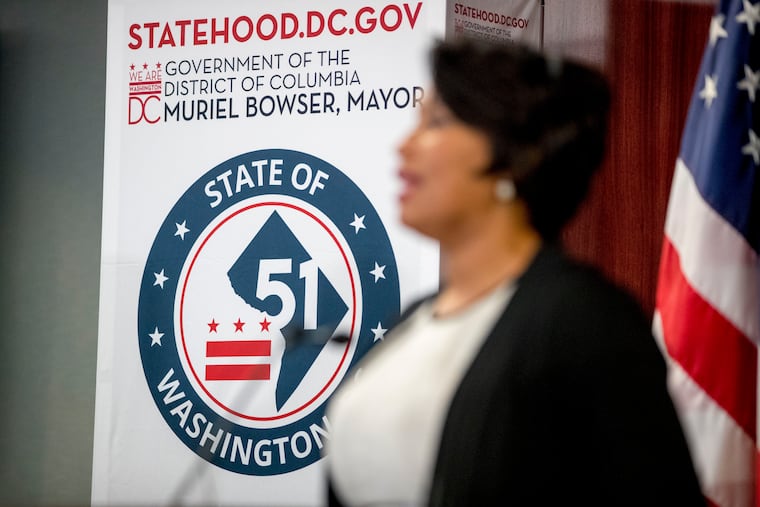Philadelphia wins if Washington, D.C., becomes the 51st state | Editorial
The Founding Fathers who met in Philadelphia in 1787 to draft the Constitution did not foresee Washington, D.C., becoming a state. But times have changed, and so should our nation.

There is a cruel irony in the discussion over D.C. statehood: the only people who don’t get a say are the people most impacted — the residents of Washington, D.C.
Last week, the House of Representatives passed a bill to make Washington, D.C., the 51st state in the union. All Democratic members of the Pennsylvania House delegation voted in favor; no single Republican joined. Now it is up to a divided Senate to decide if nearly 700,000 people, 45% of whom are Black and the majority of whom are Democrats, deserve a voting member of the House and two senators.
» READ MORE: D.C. statehood approved by House as Senate fight looms
Making D.C. a state is the right thing for the residents, who deserve representation. It is also the right thing for American democracy, particularly at this moment of great challenges to the nation.
D.C. statehood would have a huge impact on Philadelphia by simply making the U.S. Senate more representative of the nation’s population.
The U.S. Senate, like the concept of an independent federal district as the nation’s capital, was conceived at a very different time. Over the years, as cities grew, the Senate became less and less representative of the American population. The two senators from Wyoming, representing 500,000 people, have the same power as the two senators from California, representing 40 million.
The representation gap means that in the last Senate session, the Republican 53 senators majority represented 48% of America. Currently, the Democrats are in the majority with 50 senators only because the tie-breaking vote goes to Democratic Vice President Kamala Harris, despite their representing 57% of the population.
What this means in practice is that legislation that has bipartisan support in the nation is likely to not have enough votes in the Senate. That is true for minimum wage increase, expansion of voting rights, and some gun control measures — all passed the House, but are stuck in the Senate. If not for a budget reconciliation that allowed for a 50-vote passage, President Joe Biden’s American Rescue Plan wouldn’t have passed the Senate, despite support from a majority of Republican voters.
When the way to get legislation passed is to have the support of the majority of voters, democracy functions well. Giving the 700,000 predominantly Black residents of D.C. two senators would force both political parties to address the needs of that constituency.
» READ MORE: Should Washington, D.C., become the 51st state? | Pro/Con
The new state, no longer a district, would be called Washington, Douglass Commonwealth — named after the abolitionist who became a D.C. resident for the last two decades of his life. A two-mile stretch including the National Mall, the White House, and the U.S. Capitol would remain an independent federal district, as demanded by the Constitution.
It is true that the majority of the Founding Fathers who met in Philadelphia in 1787 to draft the Constitution did not foresee Washington, D.C., becoming a state. But many of these white men also did not envision Black people being free or women voting. Admitting Washington, Douglass Commonwealth to the union as a 51st state is the next frontier — not paved in conquest, but in democratic participation. The entire union, including Philadelphia, will be better off for it.